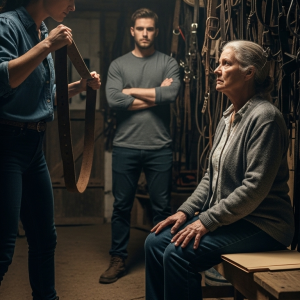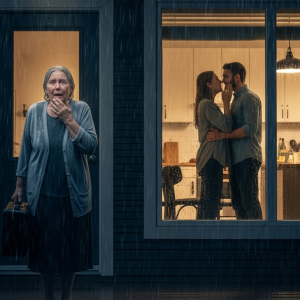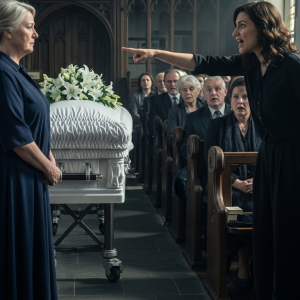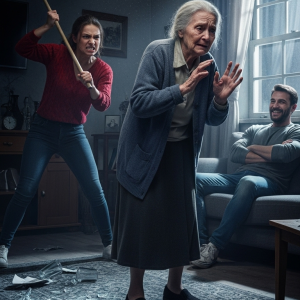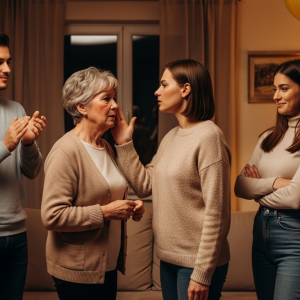The knife was in my hand when my granddaughter whispered the words that changed everything. The frosting on the birthday cake had just begun to crack under the pressure of the blade, right where I’d piped the rosettes too thick. I paused, not because of the cake, but because of her voice.
“They’re trying to have you declared unfit.”
It didn’t tremble. It didn’t beg. It landed like a flat stone skipping once across still water. That day, the house smelled of warm vanilla and the blue and white hydrangeas my daughter, Harper, had arranged in mason jars. Aesthetic, she called it. The kitchen buzzed with the soft, tense noise of people pretending to be at ease.
Harper stood by the window, perfectly lit, her cream linen dress falling just so. Her partner, Julian, poured sparkling cider into vintage glasses he’d brought in a padded case, styling the scene for a magazine shoot that was our life. And me? I stood at the island, a knife in my hand, my granddaughter staring straight through me.
Something shifted, not in the room, but beneath my skin. My spine remembered every long shift I ever worked to build this life. My hands, which had shaped so much, went still. Maya stepped closer, but she didn’t have to say it again. I knew this wasn’t drama or a simple family squabble. It was bigger.
I forced a smile and slid the knife through the lemon poppy seed cake. Harper’s favorite, not mine. The guests clapped. Someone from Harper’s wellness brand started filming. Julian wrapped an arm around Harper’s waist, debuting their perfect family moment. Maya kept her eyes on me. This birthday party never belonged to me. It was just a scene in a story they were writing, and I was merely a prop.
After the cake was served, I found Maya by the pantry door. She held her phone in her hand, her thumb hovering over the screen. She didn’t need to press play. I already knew something had cracked open, and it wasn’t just the frosting on the cake.
Julian was in the living room, his laughter a little too loud. Harper had disappeared down the hall, likely for a quick check-in with her brand team. Every memory in this house had become curated background for their narrative. Maya slid the phone into my palm. I tapped the screen.
Julian’s voice came through, low and casual. “She’s almost there. One more slip up, one more time she forgets to turn off the stove, and the doctor will sign the statement.”
Harper’s voice followed, cooler and tighter. “I’ve got the script written. We just need her out of the way before the new product line drops. If we wait too long, it looks messy.”
I didn’t breathe. I handed the phone back and stared at a bowl of lemons on the counter, wanting to smash one against the wall just to hear something break. Instead, I reached for a dish towel and began wiping a perfectly clean surface. “They want me gone,” I said, not to Maya, but to the air.
“They need your image,” Maya replied, her voice steady, “but not your voice.”
I thought of all the times I had made room for Harper—when she had stage fright, when she felt like an outcast, when her heart broke. She came home, and slowly, she made it hers. The linen curtains, the abstract prints, the new cabinet knobs. I had let it all happen, because that’s what you do when you love someone. You let things happen, until one day you look around and nothing feels like yours anymore.
Maya stepped closer. “There’s more.” She pulled a folder from her bag. Inside were printed emails, insurance documents, and a schedule for an “in-home evaluation” by a doctor I had never met. They were planning to have me declared incompetent to transfer my assets and take over everything I had built.
I didn’t go upstairs that night. I sat in the kitchen, long after the candles burned out and the house fell quiet. I stared at the lines between the floor tiles I had scrubbed a thousand times. There was a time when Harper would stand here with flour on her nose, asking why dough rises. Now, she thanked me for baking her birthday cake like I was a guest chef on her show.
I pulled open the drawer under the stove, where I used to hide her childhood drawings. Most were gone, tossed during one of her “reorganizing” phases. But one remained: a heart drawn in red crayon. For Mom. You make everything better. I put it back and closed the drawer. The warmth I once felt here was gone, replaced by the weight of someone else’s plans.
The next morning, I sat at the table with Maya and flipped through the folder. The pages felt heavier than any cookbook. One form gave Harper access to my digital accounts, bearing a signature that was almost mine. Another was a letter of intent to transfer ownership of my cooking studio to an LLC Harper had secretly registered.
The third document was an insurance policy I had never seen, listing Julian as the primary beneficiary in the event of my death. The payout was high. Too high. The house felt like it was already adjusting to a version of me that wasn’t there anymore.
I went to the kitchen and opened the drawer where Harper kept her new, sleek knives. My old ones were in a box in the garage. I had installed a lock on this drawer years ago, needing just one space that was still mine. I checked my keychain; my key was there. That night, after Harper came home, I checked the drawer again. It was unlocked. She had used her spare key.
I went to the garage, found the box with my old knives—dull wooden handles, slightly rusted—and brought them back inside. I locked the drawer again and kept both keys. This wasn’t just about money or betrayal. It was about the silent erasure of a life. One drawer, one password, one key at a time, until nothing is left of you in the house you built.
On Wednesday, Harper announced a “spontaneous mother-daughter segment” for her wellness series. Her audience, she said, loved authenticity. Julian arrived with his camera gear, greeting me with a kiss on the cheek and calling me “radiant.”
Harper swapped my old aprons for new ones bearing her logo. Julian adjusted the lighting. He asked me to stand on the left, where the light was better. I stood where I always had: in the middle. As we prepped the ingredients for my almond scone recipe—which Harper called an “inspired fusion”—Maya quietly placed a small, hidden camera between the cookbook stand and the spice rack.
Harper took center screen, introducing me like a special guest. She spoke about legacy and generational knowledge, her tone syrupy. Behind the camera, Julian mouthed lines to her. When the recording stopped, the performance ended. Julian handed Harper a drink. “It felt a little flat,” she said, turning to me with a smile that didn’t reach her eyes. “You weren’t giving enough energy. Maybe we can try again later, something more emotive.”
Later, Maya showed me the footage from her hidden camera. It captured everything: the way Harper’s practiced smile vanished the moment the camera was off, the way Julian referred to me as the brand’s “nostalgic anchor.” They weren’t building a legacy. They were building a product, and I was the packaging.
On Friday, Maya skipped her morning lecture and sat at the dining table with her laptop. She tapped the screen, showing me a profile. “Detective Noel Avery,” she said. “Financial Crimes and Elder Protection Unit. She investigated a case where a son used forged documents to control his mother’s assets. The son lost everything. The mother got her name back.” Maya had already sent a message.
Harper came home around noon, dressed in a soft white sweater. She said the kitchen felt “stale” and that we should repaint before the next shoot. On the counter, I had placed an old, faded recipe card for lemon cornbread. Her mouth curved slightly. “That one’s old,” she said. “It doesn’t fit the brand anymore.” Then she went upstairs.
I slipped the recipe into my apron pocket. That afternoon, Detective Avery called back. Maya took notes as they spoke in short, quiet sentences. We were building something, carefully, like a slow stew on a back burner.
Before bed, I wrote a list of my own recipes—the ones Harper had erased from the website, the ones I used to make when the house was filled with real laughter, not canned applause. I folded the list and put it under my pillow. Sometimes you don’t fight fire with fire. Sometimes you let them light the match, and then you wait.
On Sunday, with Harper and Julian away for a speaking event, I took out the old cast-iron skillet. It had been my mother’s, with a worn handle and a tiny crack along the edge. I scrubbed it clean, oiled it, and left it to heat in the oven.
That night, I announced a special live stream with a quiet post: a picture of the old skillet and a folded recipe card. No hashtags, no filters, no Harper. Just a time. Tuesday evening. One camera, one stove, one story.
By the next morning, the post had more shares than anything Harper had ever published. Followers left comments, saying they missed my cornbread, that they missed me.
Tuesday came. I wore my oldest apron. Maya set up a single camera. When Harper and Julian returned, they said nothing about it. At 6:00, I handed Maya a sealed envelope containing all the evidence we had gathered. “I want this filed with the attorney first thing tomorrow,” I said. She nodded.
At 7:00, I stepped into the frame. Just me and the skillet.
The live stream started without a countdown or music. The kitchen lights were low and warm. It wasn’t a performance; it was a return. I spoke slowly about food and memory, about how I used to make this cornbread for Harper after piano practice, how she once called it “magic bread.”
Halfway through, Harper stepped into the shot. She smiled, placed her hand on my shoulder, and called the moment “spontaneous and beautiful.” Julian adjusted his lens to capture the tender scene. It was choreographed down to the breath, but they hadn’t written my ending.
Once the batter was in the oven, I reached below the counter and lifted a single manila folder. I set it next to the stove. “I want to share one final ingredient,” I said, my voice steady. “Not for the bread, but for the truth.”
I opened the folder. Inside was a printed transcript of their recorded conversations, copies of the forged documents, and a notarized affidavit from my attorney. I didn’t raise my voice. I didn’t accuse. I simply read one line from their recorded conversation.
“This is what it sounds like when a family chooses a brand over integrity.”
I closed the folder, slid it toward the edge of the counter, and looked directly into the camera. Harper stood frozen. Julian lowered his camera. In the silence, Maya ended the stream. The message had already left the room.
The morning after, the house was still with a new kind of silence. Maya’s laptop glowed with thousands of messages from strangers and old friends. We saw you. We believe you. You reminded me of my own mother.
Harper and Julian didn’t come downstairs until after 9. Her face was a calm mask, but her jaw was locked. Julian paced, mumbling about public image and legal steps. By noon, the fallout had begun. Harper’s brand partnership announced a “review.” The wellness platform removed her profile from its homepage.
By late afternoon, Julian was gone. He packed his camera gear and left without a word. Harper spent the day in her room. That night, I made dinner for Maya and me. As we ate, I saw Harper in the hallway archway, watching us. She looked smaller, less polished. She opened her mouth to speak, then closed it, gave a single nod of acknowledgement, and walked away.
I didn’t need to lock the kitchen drawer anymore. It was mine again. It held my space, and no one was taking it this time.
Within a week, Harper’s brand deals were cancelled. A notice arrived from the licensing board: a formal inquiry had been opened into “misrepresentation in financial filings and potential exploitation of a dependent adult.”
That Sunday, I took back my cooking studio. The chalkboard Harper used for branding slogans still had her handwriting on it. I didn’t erase it. I turned it over and wrote something new: Legacy does not require performance.
On Monday morning, Maya and I went to the courthouse. With the original articles of incorporation, I restored my name to the studio’s record. There was no announcement, just a quiet update in a dusty registry. That night, I stood in my own kitchen and baked cornbread in my mother’s skillet. The smell was familiar and real. Something was becoming whole again.
Two weeks later, I reopened the studio. There were no flyers, just an open door and the smell of bread. The chalkboard wall now bore a simple message: You are still welcome here. I called it The Kitchen Without Conditions—a place where women my age could gather not to perform, but to cook, speak, and breathe.
Word spread slowly, one woman at a time. We shared recipes written on the backs of old bills. One afternoon, a woman named Lorraine brought butter cookies. She said her daughter hadn’t spoken to her in four years, but she still baked those cookies every Sunday, just in case. I didn’t ask for details. I just handed her a plate. In the quiet between instructions, I realized the weight I had been carrying—the need to be useful, to perform—was finally gone.
The first rain of the season came, a gentle hush against the windows. The house felt full in a new way, not with noise, but with presence. I found a note Harper had written when she was eight: Thank you for making things feel safe. I left it on the windowsill.
As I pulled a fresh pan of cornbread from the oven, I heard steady footsteps on the porch. I didn’t turn around. I sliced the bread, placed two pieces on a plate, and sat down at the table. I didn’t need to speak.
Some stories end with a door closing. Mine stayed slightly open, long enough for the scent of home to reach whoever needed to remember it. Long enough for me to finally feel whole, without needing to be seen at all.
